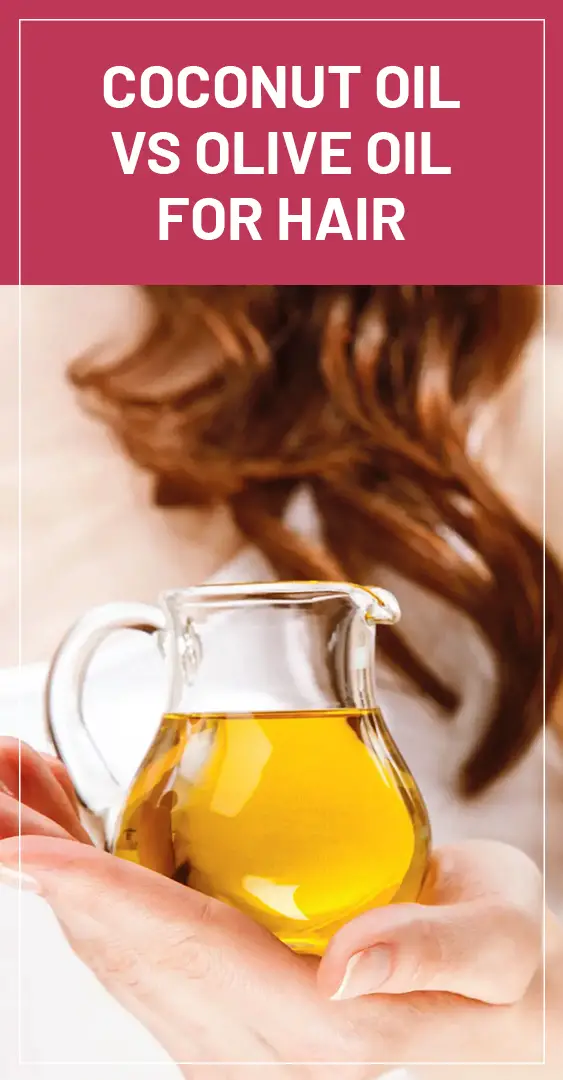
Important: This article is for informational purposes only. Please read our full disclaimer for more details.
Going an extra mile to bring shine, luster, and volume to the hair is not uncommon. Getting healthy hair is like a dream come true as it makes one look more beautiful. Therefore, people look for the best hair care products.
The debate about which oil, coconut oil or olive oil, is better for hair has been a hot topic of discussion in recent years. The beauty benefits of both these oils are well known that have divided people into two groups.
While coconut oil has been used traditionally in South Asian countries for a long time, the popularity of olive oil in the west requires no introduction. Due to this, choosing between coconut oil and olive oil for hair has put people in a dilemma.
Therefore, here we will discuss coconut oil vs. olive oil for hair, their properties, and how they can make hair grow more healthily and beautifully.
Let’s dive in!
Article Contains
Coconut oil vs. Olive oil for hair
We all know these oils are great for hair, skin, and overall health. However, a few properties make them different from each other. Let’s take a look at them.
MAJOR CONSTITUENTS
Coconut Oil- A rich source of medium chain fatty acids, coconut oil consists of lauric acid, capric acid, and caprylic acid as the major constituents. There are two types of coconut oil available in the market-
- Copra oil or normal coconut oil
- Virgin coconut oil
The normal coconut oil is extracted from dried coconut kernels, followed by refining, bleaching, and deodorizing. While undergoing all this, some nutrients from coconut oil are lost.
On the other hand, virgin coconut oil is extracted from shredded wet coconut kernels by cold pressing. It helps to maintain the virtue of coconut oil intact.
Therefore, virgin coconut oil is considered more beneficial and a good source of Vitamin E and bioactive compounds like polyphenols.
Olive Oil- It is one of the healthy plant oils and consists of oleic acid, phenolic constituents, and squalene– everything beneficial for hair. It is extracted from the pulp of olive seeds and undergoes processing to make it market-ready.
There are four types of olive oil available in the market-
- Virgin olive oil
- Common olive oil
- Pomace olive oil
- Refined olive oil
Out of these, virgin olive oil is available in its pure form. It consists of most of the beneficial bioactive compounds and is loaded with nutrients. Mono and polyunsaturated fatty acids are abundant in olive oil, making them useful for most health issues.
Additionally, the presence of Vitamin E makes it even more beneficial when it comes to hair health.
BENEFITS
Coconut Oil
- Penetrates Deeply- The molecular weight of coconut oil is low. It helps this oil penetrate better into the hair shaft than any other oil. Low molecular weight also helps remove the oil after shampooing, leaving no residues on hair and scalp.
- Retains Moisture Longer- Coconut oil ensures deep moisturization. It does not evaporate or break down easily. It ensures that hair retains moisture for longer, which prevents breakage. At the same time, a deeply moisturized scalp does not allow dandruff to grow.
- Natural Coolant- The cooling effect of coconut comes naturally that helps in soothing and calming the scalp. It helps nourish the hair from the roots and makes them stronger.
- Antibacterial- Different studies have confirmed the antimicrobial properties of coconut oil. It helps keep lice infestation at bay, ensuring healthy hair growth. Likewise, it prevents fungal infection, bacterial infection, and issues like eczema.
- Antioxidants- Coconut oil is rich in antioxidants that protect hair from sun and chemical damage. It slows down hair loss and also prevents premature graying of hair.
Apart from all these, coconut oil adds shine and softness to the hair, making it a one-stop solution for hair care.
Olive Oil
- Extra Moisturize The Hair- The high molecular weight of olive oil makes it thicker in consistency compared to coconut oil. It provides deeper and better moisturization to hair.
However, shampooing hair after olive oil massage will not remove the oil completely, and some residue will remain. Therefore, it is more beneficial for thick, curly, dry, and frizzy hair. - Reduces Dihydrotestosterone (Dht) Production- DHT is an androgen responsible for hair loss. This hormone is the main reason behind the weakening of hair follicles, which causes hair thinning, especially in males. Olive oil neutralizes androgens or DHT and thus reduces hair loss.
- Antioxidants- Olive oil is rich in antioxidants, making it a healthy option for the heart, hair, and overall health. It cleanses the scalp and restores its pH balance, promoting the regeneration of new hair follicles.
Final Words
Both coconut and olive oil are beauty staples and work wonders on skin and hair. However, when it comes to comparing and deciding which is better, coconut oil looks more promising.
Whether you put oil every day on hair or massage once or twice a week, coconut oil is the best option to keep them well-nourished and moisturized. Besides, coconut oil is inexpensive compared to olive oil, making it a lucrative option for everyone.
However, at the same time, we cannot deny the benefits olive oil delivers to hair. So, using coconut oil often and keeping a bottle of olive oil handy once in a while is the best option. It will give the benefits of both these amazing oils and keep hair healthy and shining.
You Might Also Like:
- What to Mix with Coconut Oil for Hair Growth
- How to Use Coconut oil for Dry Hair Treatment?
- 7 Best Coconut Oils For Healthy And Nourished Hair
- Which Oil Is Best for Hair Mustard or Coconut?
- How to Use Coconut Oil for Hair? Benefits, Uses and Hair Masks
- Which Better Castor Oil or Coconut Oil for Hair Growth?
- Olive Oil (Jaitun Ka Tel): Amazing Benefits and Uses
- Coconut Oil for Eyebrows: Benefits and Uses
- How to Use Coconut oil for Dry Hair Treatment?
- Olive oil Face Mask: Benefits and Recipes
- 12 Unexpected Beauty Uses for Olive Oil
- How to Use Olive Oil for Hair Growth?
- 7 Best Olive Oils For Hair
- 7 Best Coconut Oils For Healthy And Nourished Hair
















